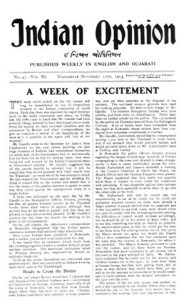On 4th June 1903, Mahatma Gandhi released his newspaper ‘Indian Opinion’ in South Africa to fight against racial discrimination and demand civil rights for Indians in that country. The topic, ‘Indian Opinion Newspaper’ is important for the IAS Exam from the context of the History subject asked in prelims and Mains GS-I. Read on for knowing more about this piece of Indian History.
| Aspirants should begin their preparation by solving UPSC Previous Year Question Papers now!!
To complement your preparation for the upcoming exam, check the following links: |

Quick Facts about Indian Opinion Newspaper
The table below mentions important facts related to the newspaper, ‘Indian Opinion’:
| Indian Opinion Newspaper – Facts for UPSC Prelims | |
| Who established the Indian Opinion Newspaper? | Mohandas Karamchand Gandhi found Indian Opinion newspaper |
| When was the Indian Opinion Newspaper first published | In 1903, the first edition of the Indian Opinion newspaper came out |
| What was the significance of the Indian Opinion Newspaper? | It was an important tool in the fight against the racial discrimination against the Indian immigrant community that was residing in South Africa |
| Who were the supporting elements in bringing out the newspaper? | Natal Indian Congress supported MK Gandhi in assembling a print |
| In which all languages was the Indian Opinion newspaper published? | The newspaper was published in the following languages:
|
| Who was the editor of the Indian Opinion Newspaper? | Natal Indian Congress Secretary Mansukhlal Nazar served as the editor of the newspaper. The other people who took on as the editor of the Indian Opinion newspaper over the period of time were:
Note: Manilal Gandhi was the longest-serving editor of the newspaper |
Indian Opinion Newspaper – Background & Details
- Mahatma Gandhi arrived in South Africa in 1893 as a young lawyer. Although he had arrived on a year-long assignment, he ended up staying there for 21 years.
- It was in South Africa that he evolved from being a shy lawyer into a persistent civil rights activist. After witnessing and experiencing first-hand racial discrimination in that country (he was once thrown out of a first-class compartment of a train for not being white), he decided to stay on and fight for the rights of Indians. South Africa was home to a large number of Indians ever since the British had been taking them to its African colony as indentured labourers throughout the nineteenth century.
- In 1903, Gandhi settled in Johannesburg and helped in the establishment of the British Indian Association.
- Gandhi, along with other Indians demanded for civil rights and fought against discriminatory laws and rules, particularly in Transvaal. He was developing the idea of Satyagraha and passive resistance during these times.
- It was decided that a newspaper was essential to voice the concerns of the people and to bring about awareness about the conditions of Indians under the racially intolerant white regime.
- In his book, ‘Satyagraha in South Africa’, Gandhi writes, “I believe that a struggle which chiefly relies upon internal strength cannot be wholly carried on without a newspaper…”
- He arranged a printing press and hired a few people as staff with the support of the Natal Indian Congress and a few other prominent Indians in South Africa.
- Gandhi did most of the writing and the first editor was Mansukhlal Hiralal Nazar.
- The first issue was released on 4th June 1903.
- The initial tone of the newspaper was moderate. It reiterated Indians as ‘loyal subjects of the King Emperor’ and reiterated faith in the British system.
- But it also brought to light the oppressive conditions under which Indians in South Africa lived and worked.
- It was a weekly newspaper and was published in English, Hindi, Tamil and Gujarati.
- The newspaper sought to unify Indians of all hues and declared in an editorial, “We are not, and ought not to be, Tamils or Calcutta men, and Mohamedans or Hindus, Brahmans or Banyas, but simply and solely British Indians.” It must be remembered that Gandhi, at that time, believed in the justness of the British Empire.
- After Gandhi left South Africa for good in 1914, the newspaper was managed and brought out by his son Manilal. Manilal was its editor for 36 years. After his death in 1956, the newspaper was run by others. Its name was also changed to ‘The Opinion’.
- But the ‘Indian Opinion’ practically ceased to exist on 4th August 1961 owing to financial problems. 39 years later, it was revived in October 2000. Now, a trust runs it and publishes in English and Zulu.
See previous ‘This Day in History’ here.
Mahatma Gandhi has been a pioneer in the Indian Independence Struggle. Aspirants shall read important topics related to Gandhi from the table below:
| Mahatma Gandhi arrested in South Africa | Salt Satyagraha |
| The Rise of Gandhi in Indian Freedom Struggle | Champaran Satyagraha |
| Gandhi-Irwin Pact | Dandi March |
The above details would help candidates prepare for UPSC 2023.
Related Links
Comments